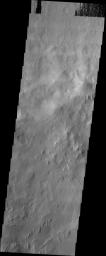
|
MSIP: Hale Crater
- Click the image above for a larger view
- Full-Res JPEG (1349 x 3254) (345.1 kB)
- Full-Res TIFF (1349 x 3254) (2.9 MB)
Caption:
Released 29 April 2004
This image was taken by the Mercury Mine 5th grade MSIP team in order to answer the question -- Is there water erosion on crater walls? It is located at Hale Crater, lat. 33.1S and long. 324.4E. It shows a crater wall with smaller craters and groves.
This MSIP team consists of 22 5th graders at Mercury Mine Elementary in the Paradise Valley school district. Our instructor is Mr. Collins. We started the program in early October 2003 and went to ASU in March of 2004. All in all we had a GREAT time!
Image information: VIS instrument. Latitude -33.7°, Longitude 324.4° East (35.6%deg; West). 19 meter/pixel resolution.
Note: this THEMIS visual image has not been radiometrically nor geometrically calibrated for this preliminary release. An empirical correction has been performed to remove instrumental effects. A linear shift has been applied in the cross-track and down-track direction to approximate spacecraft and planetary motion. Fully calibrated and geometrically projected images will be released through the Planetary Data System in accordance with Project policies at a later time.
Background Info:
NASA and Arizona State University's Mars Education Program is offering students nationwide the opportunity to be involved in authentic Mars research by participating in the Mars Student Imaging Project (MSIP). Teams of students in grades 5 through college sophomore level have the opportunity to work with scientists, mission planners and educators on the THEMIS team at ASU's Mars Space Flight Facility, to image a site on Mars using the THEMIS visible wavelength camera. For more information go to the MSIP website: http://msip.asu.edu .
NASA's Jet Propulsion Laboratory manages the 2001 Mars Odyssey mission for NASA's Office of Space Science, Washington, D.C. The Thermal Emission Imaging System (THEMIS) was developed by Arizona State University, Tempe, in collaboration with Raytheon Santa Barbara Remote Sensing. The THEMIS investigation is led by Dr. Philip Christensen at Arizona State University. Lockheed Martin Astronautics, Denver, is the prime contractor for the Odyssey project, and developed and built the orbiter. Mission operations are conducted jointly from Lockheed Martin and from JPL, a division of the California Institute of Technology in Pasadena.
Cataloging Keywords:
| Name | Value | Additional Values |
|---|---|---|
| Target | Mars | |
| System | ||
| Target Type | Planet | |
| Mission | 2001 Mars Odyssey | |
| Instrument Host | Mars Odyssey | |
| Host Type | Orbiter | |
| Instrument | Thermal Emission Imaging System (THEMIS) | |
| Detector | ||
| Extra Keywords | Crater, Grayscale, Thermal, Water | |
| Acquisition Date | ||
| Release Date | 2004-04-30 | |
| Date in Caption | 2004-04-29 | |
| Image Credit | NASA/JPL/Arizona State University | |
| Source | photojournal.jpl.nasa.gov/catalog/PIA05843 | |
| Identifier | PIA05843 | |
